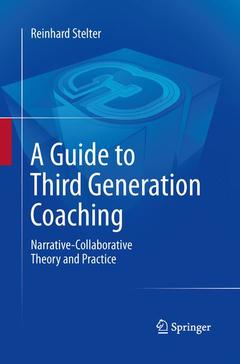Description
A Guide to Third Generation Coaching, Softcover reprint of the original 1st ed. 2014
Narrative-Collaborative Theory and Practice
Author: Stelter Reinhard
Language: English
Subjects for A Guide to Third Generation Coaching:
Publication date: 08-2015
Support: Print on demand
Publication date: 09-2013
250 p. · 15.5x23.5 cm · Hardback
Description
/li>Contents
/li>Biography
/li>Comment
/li>
Third generation coaching proposes a form of dialogue where coach and coachee are focused on creating space for reflection through collaborative practices and less concerned with fabricating quick solutions. Aspiring to achieve moments of symmetry between coach and coachee, where their dialogue is driven by a strong emphasis on meaning-making, values, aspirations and identity issues. Coach and coachee meet as fellow-humans in a genuine dialogue.
Marking a new trend in coaching, based on the acknowledgement of changes in society, learning and knowledge production, as well as leadership, while distinguishing itself from the existing models (pop coaching, GROW model, etc.). Third generation coaching is based on a fresh analysis of our society ? a society that is characterized by diversification, identity challenges, abolition of the monopoly of knowledge, lifelong learning, and the necessity for self-reflection.
Providing quality material to guide ambitious practitioners and high level coaching education programs, in an accessible format. A Guide to Third Generation Coaching advocates a revisited and innovative approach to coaching and coaching psychology, advantageous for learners and practitioners alike, by supporting the reader as a reflective practitioner.
?In this insightful book Reinhard Stelter takes coaching to a new level. With its new perspective, it will make an outstanding contribution to the field.?
Prof Stephen Palmer, Centre for Coaching, London, UK, President of the International Society for Coaching Psychology (ISCP)
?This book is a wonderful contribution to further theoretical understanding and evidence-based practice within Coaching andCoaching Psychology. Reinhard provides us with a look at the foundations contributing to this field, the benefit of his experience and learning, and the evolution of thinking to our current state. Whether you are a coach, coaching psychologist, leader, manager or student, you will find this an excellent resource to expand your thinking, reflection, exploration, and learning on your journey.?
Diane Brennan, MBA, MCC, Past-President International Coach Federation (ICF) in 2008
?A thoughtful and wide ranging journey through the philosophy of coaching. Professor Stelter brings positive psychology, dialogue, and narrative approaches together into a model of coaching designed to meet the needs of clients in today?s world.?
Dr. Michael Cavanagh, MClinPsy, PhD, Deputy Director, Coaching Psychology Unit, School of Psychology, The University of Sydney
Reinhard Stelter holds a PhD in psychology and is Professor of Sport and Coaching Psychology and head of the Coaching Psychology Unit at the Department of Nutrition, Exercise and Sports, University of Copenhagen. Furthermore he is visiting professor at Copenhagen Business School (Master of Public Governance).
He is Honorary Vice President and accredited member of the International Society for Coaching Psychology, member of the Scientific Advisory Council of the Institute of Coaching at Harvard and editorial board member of the International Coaching Psychology Review, of Coaching: Theory, Research and Practice, of the International Journal of Mentoring and Coaching and co-editor of Coachingpsykologi - The Danish Journal of Coaching Psychology as well as editor and author of many books and journal articles. His theoretical ground in coaching is inspired by phenomenology, systemic thinking, social constructionism and narrative and collaborative practice. In 2009-11 he has been leader of a research project – a randomized control trial – with a focus on narrative-collaborative group coaching, where he could document and positive effect of coaching on personal well-being and social recovery. During the last couple of years he has been invited speaker on coaching and coaching psychology conferences in many parts of the world.



